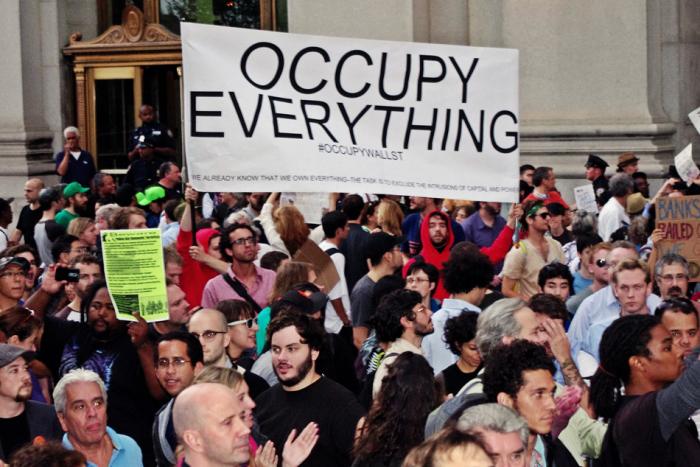Last summer, Alexandra Kimball wrote an essay in these pages about the unfair system of unpaid internships, a piece that remains one of Hazlitt’s most popular features ever. It’s a story that continues to resonate, and now, almost a year later, after a series of unexpected lawsuits targeting the practice, Alexandra checks back in with an update.
It’s July; if you work in publishing, the arts, a non-profit, fashion, a hospital, or apparently even a restaurant, you may think of it as “intern season.” Though this year intern season might feel a bit different. In June a federal district court in Manhattan made a historic decision: Fox Searchlight Pictures had violated labour laws by not paying interns who worked on the set of Black Swan. The ruling, which could potentially render thousands of unpaid gigs illegal, was the culmination of a high-profile case that had provoked an unprecedented level of action and commentary.
In February, a division of Occupy Wall Street called Intern Labor Rights set up camp at the intern-saturated New York Fashion Week, and more lawsuits against corporations—Condé Nast, Bell Mobility, and Gawker Media among them—have been filed. With unpaid-labour plotlines on the TV show Girls and the movie The Internship, we’ve also seen the birth of the intern as cultural type. In 2008, no one talked about the fact that Lauren Conrad, Teen Vogue intern on reality show The Hills, was not getting paid. Now, on the similarly apolitical Gallery Girls, we have an intern crying in front of her employer: “I just can’t keep doing these internships for you. I’ve done this since college.” Owen Wilson’s character in The Internship is played for laughs, but his story—he’s 30-something, laid-off, and interning is his best shot at getting a job at Google—is plausible. Whether defeated or comedic, openly upset or blindly optimistic, the interns on screen now are notable because they are sympathetic. Unpaid internships have become visible.
The amount of media coverage on the topic—not only from bloggers but traditional outlets, too—has been amazing: not just prolific, but detailed and passionate and interesting. Which is not to say that it’s been straightforward. Unlike other labour issues, opinions about unpaid labour don’t follow the expected right/left politics. Traditionally, industries that rely most heavily on interns—arts, non-profits, publishing—have supported and been supported by the political left, the same strata that fought bloodily for minimum wage legislation, unions, equal pay for minorities and women, and so forth. Without unpaid labour, some say, many charities, arts organizations, and so forth, would crumble (a case made recently in The Atlantic).
On the other hand, the rebuttal goes, can any system that depends so heavily on free workers be sustainable, let alone truly progressive? The conversation is unpredictable, in part, because interning is not just a legislative issue, but a slippery, symbolic one. Like other urgent topics before it—subsidized health care, affirmative action, and more recently, same-sex marriage—the question of unpaid labour seems to reveal people’s most elemental assumptions and fears. Scroll down any comments section on any internship think-piece to see how quickly the conversation morphs into one about the economy, social immobility, and, because the people getting screwed are largely young, the millennial generation. In Canada, 100,000-300,000 people work for no pay; in the best-case scenario, the U.S. ruling will impel new legislation for these positions, too. But the major accomplishment, in my mind, has already happened: people are talking about the intern system, and through this, the various attitudes and policies that enabled it to take hold.
I’m not sure how to properly communicate how huge this is, how far we’ve come since the spring of 2012, when I sat down to write a screed about the intern system in Hazlitt’s early days. I had been pitching essays about interning for years, with no takers—it was an off-the-radar issue for mainstream media. While the unpaid internship had all but replaced an actual job as the de facto mode of entry-level employment, talking about how shitty and immoral and dangerous this was was not really done. Most people my age and younger had been affected by the rise of internships, but the truth of our experiences—be it the indignity of working for free or, for those who can’t afford to intern, the resentment of being locked out from the get-go—had been buried.
What buried us was fear (if I complain, will I ever get a job?), but also a very real taboo around ingratitude. I’m not sure when or why (Oprah? Those Lululemon bags?), but questioning one’s circumstances, no matter how unfair or damaging they may be, has become the huge social “Don’t” of our time. But the problem with the gratitude imperative is that it renders people mute about the topics we need to talk about most. I wrote my internship essay in a haze of confusion, wondering how a fact that seemed so self-evident—that the replacement of jobs with unpaid internships was ethically wrong, and particularly punitive to grads from non-privileged backgrounds—could have occurred to me alone.
I wasn’t alone, of course; I know this now. I know this because a production intern fought Fox in court and won, but I also know this from blogs, and regressive, offensive think-pieces on internships as “opportunity,” and a few one-off lines on a silly reality show. The new attention to internships has allowed us to question not just the pragmatic reality of donating one’s labour to corporations for years, but the isolation and shame that envelops it. “You are [...] told, either explicitly or tacitly, not to talk about it,” Sarah Kendzior, who has written extensively about the post-employment economy for Al Jazeera, said in a recent interview for Policymic. The silence surrounding the intern system, she suggests, both explains and compounds its perniciousness. “If people do not feel comfortable discussing their financial hardship, or their misgivings about an economy in which they are unfairly advantaged, then no progress will be made.” In other words, talking about interning—not just how it happens, but how we feel about it—is important not just because it will impel policy change, but because it is fundamentally empowering to the people who have the most at stake. Working for free, or, if you can’t afford that, being perpetually underemployed, is difficult and depressing, but doing so alone and in silence while having to act grateful for this is frankly degrading. If nothing else, this past year of action and discussion has made it possible for people who are struggling, employment-wise, to dodge the latter.
So bring on intern season, I say. Let’s see what it looks like after a year of real action and debate. Legislative change might still be years away, but we’ve won the luxury of open ingratitude. You may not earn any money—or even the chance to earn money—but the right to complain is priceless.
Alexandra Kimball will appear on this Thursday’s edition of The Arcade, Hazlitt’s podcast, to discuss the unpaid internship issue further.






